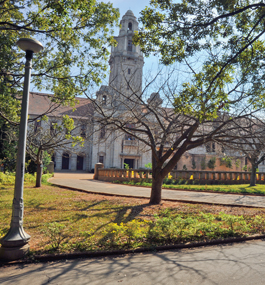President’s Trip Advances Partnerships Across India

Photo by Mekunda De
Brandeis and India’s National Centre for Biological Sciences in Bangalore plan to collaborate on numerous scientific endeavors.
Faculty and administrators of Brandeis University and India’s National Centre for Biological Sciences (NCBS) have agreed to work toward creating a formal institutional partnership that would involve graduate students, undergraduates and postdocs.
At a February meeting on the NCBS campus in Bangalore, representatives of the schools enthusiastically explored possible starting points. The first full planning meeting could take place this summer, when several Brandeis professors will be working at NCBS.
Division of Science Chair Eve Marder, who had visited NCBS in January to deliver a lecture, laid the groundwork for the meeting, at which Brandeis was represented by President Fred Lawrence; Vice President for Global Affairs Daniel Terris; and Bulbul Chakraborty, the Enid and Nate Ancell Professor of Physics.
Faculties at Brandeis and NCBS have long had close relationships. Three labs at NCBS are headed by researchers who did their graduate or postgraduate work at Brandeis, and Yumna Siddiqi, daughter of NCBS founder Obaid Siddiqi, graduated from Brandeis in 1986.
Among the areas identified for possible collaboration were exchanges of graduate students in labs where Brandeis and science center faculty already have one-on-one relationships; a Justice Brandeis semester during which undergraduates from the U.S. university would work and study in the Indian center’s wildlife conservation program; and postdoctoral fellowships that would involve work at both institutions.
Planners emphasized that the envisioned partnership would have strong benefits for both sides. The United States has a number of highly qualified researchers but a relative shortage of funding; on the other hand, funding is abundant in India, which suffers from a relative shortage of high-level researchers.
President Lawrence told the NCBS representatives that institutionalizing connections with their center makes sense because Brandeis is looking for “sustained, deep engagement in a select number of countries,” particularly Israel and India, and because Brandeis and NCBS are both relatively small institutions with significant interest in neuroscience.
